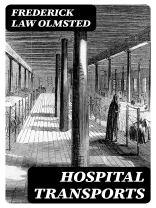In ‘Hospital Transports, ‘ Frederick Law Olmsted meticulously examines the logistical and emotional complexities of transporting wounded soldiers amidst the chaos of the Civil War. Written in a clear yet poignant prose style, Olmsted’s work reflects a profound understanding of both humanitarian concerns and logistical challenges. Through detailed accounts and observations, he critiques contemporary medical practices while advocating for a more compassionate and systematic approach to wartime medical care. The book serves as a crucial document that not only captures the horrors of war but also highlights the burgeoning field of medical transportation, situated in a stark historical moment where the evolution of public health began to take precedence. Frederick Law Olmsted, renowned as a landscape architect and social critic, was deeply influenced by his experiences observing the effects of war on both the body and psyche of individuals. His background in agriculture and his commitment to social reform motivated him to delve into the intricacies of medical care during a tumultuous period in American history. Olmsted’s unique perspective, drawn from his own encounters with societal needs and the built environment, enriches the narrative and underscores the imperative for humane treatment in the face of adversity. ‘Hospital Transports’ is essential reading for those interested in Civil War history, medical ethics, and the evolution of healthcare practices. Olmsted’s thorough analysis and perceptive insights will resonate with readers, offering a compelling call to action for compassion in medical transportation and broader societal implications. This work not only stands as a historical artifact but also as a timeless reminder of the responsibility we bear for our vulnerable populations.
Over de auteur
Frederick Law Olmsted (1822–1903) is often remembered as the father of American landscape architecture, though his written contributions, such as ‘Hospital Transports: A Memoir of the Embarkation of the Sick and Wounded from the Peninsula of Virginia in the Summer of 1862′, also cement his reputation as a significant figure in American literary and cultural history. This publication offers a glimpse into Olmsted’s deep concern for social issues and his humanitarian spirit, which were also reflected in his landscape designs. As a writer, Olmsted’s style is informative, yet suffused with a palpable empathy, revealing the conditions and the human element within the historical context of the Civil War. His narratives are not merely accounts, but are imbued with an advocacy for the betterment of society. This dual legacy in literature and landscape architecture has left an indelible mark on America’s physical and literary topography, influencing both urban planning and the genre of medical transport literature. Olmsted’s descriptive acumen, combined with his passion for both nature and human welfare, results in a body of written work that complements his better-known achievements in designing some of the nation’s most iconic public spaces, such as Central Park in New York City and the Emerald Necklace in Boston.












